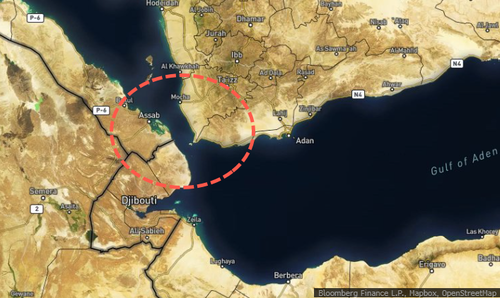Oil Tanker Struck By Missile Off Yemen Coast
As Ukrainian drones relentlessly target Russia’s energy complex, tensions in the Middle East are once again rising. Early Saturday, Agence France-Presse reported that a crude oil tanker was hit by a missile off the coast of Yemen. These mounting geopolitical risks underscore the possible need for a higher risk premium on Brent crude prices.
Maritime security firm Ambrey told AFP News that the oil tanker was near the Bab el-Mandeb strait and about ten nautical miles southwest of the city of Mokha at the time of the incident.
Ambrey indicated the Panama-flagged oil tanker was hit by a missile and that there was a fire in the steering gear flat.
Since November, Iran-backed Houthi rebels have been attacking commercial vessels linked to Western nations passing through the Bab el-Mandeb strait and the Red Sea, mostly in response to their support for Israel in the war against Hamas in Gaza.
In recent weeks, Yahya Saree, spokesperson for the terror group, warned in a televised speech that rebels intend to target Israel-linked ships in the eastern Mediterranean.
With President Biden’s Operation Prosperity Guardian failing to defend maritime traffic in the region, Iran and their proxy groups have successfully severed a major shipping route for some Western companies, forcing them to divert around the Cape of Good Hope.
We have outlined one major example of Biden’s failures in the Red Sea:
“Dramatic Picture For History Books”: LNG Tankers Still Absent From Red Sea
Biden’s Red Sea Failure Exhibited In One Map
In April, the international shipping industry pleaded with the United Nations for help, urging increased military patrols along key shipping routes in the Middle East. We have pointed out several maritime chokepoints, including the Suez Canal, Bab-El Mandeb Strait, and Strait of Hormuz, through which a quarter of all global trade flows, are experiencing increased conflict.
In a recent note, MUFG provided a global snapshot of the world’s maritime chokepoints.
In markets, Brent crude prices have traded between $80/bbl and $90/bbl this year on rising geopolitical tensions in the Middle East and Eastern Europe. Last month, there was fear that the Israel-Iran conflict would send Brent prices into triple-digit territory. However, prices have since declined to the $83 handle.
This chaos is a sign of weakness from the West as the world fractures into a multipolar state. More turmoil and disruptions in global supply chains are yet more evidence oil prices will stay elevated unless central banks plunge the world into a global depression.
Rapidan Energy Group commented on this incident: “The latest attack is yet another reminder of an underpriced geopolitical risk premium in oil as multiple armed actors remain undeterred by US-led diplomacy and maritime coalitions.”
Tyler Durden
Sat, 05/18/2024 – 11:05




Share This Article
Choose Your Platform: Facebook Twitter Linkedin